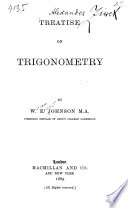 | William Ernest Johnson - Plane trigonometry - 1889 - 574 pages
...vectors. 701. Since p.Zt-*.qZ'*'=pq.Ze^, we have the f undamentally important theorem that The modulus of the product of two complex numbers is equal to the product of their moduli. 702. To expand the cosine and sine of an angle in terms of its circular measure. Let (OA) be... | |
 | Arthur Gordon Webster - Electricity - 1897 - 594 pages
...<£- + - , it follows that cos <£ + i sin <f> = e**, p = !p/e*. It is easy to show that the modulus of the product of two complex numbers is equal to the product of their moduli, and that the argument is equal to the sum of their arguments. For if p=ai+ibi = ri (cos ^ +... | |
 | Ernest Julius Wilczynski - Algebra - 1916 - 542 pages
...commutative, and distributive laws of multiplication are assumed to hold for all complex numbers, the modulus of the product of two complex numbers is equal to the product of the moduli of the factors, and the amplitude of the product is equal to the sum of the amplitudes of... | |
 | Leonard Eugene Dickson - Equations, Theory of - 1922 - 188 pages
...8 sina)+t(sin 6 cosa+cos 6 sin a)] = rr'[cos (0+a)+isin (0+a)], by trigonometry. Hence the modulus of the product of two complex numbers is equal to the product of their moduli, while the amplitude of the product is equal to the sum of their ampiitudes. For example, the... | |
 | Helen Abbot Merrill - Algebra - 1917 - 282 pages
...evidently true, and (1) may be derived from it, it follows that (1) is true. 191. Theorem. The modulus of the product of two complex numbers is equal to the product of their moduli. Let the two numbers be a + bi and c + di. To prove that the modulus of ac — lid + (ad + bc)i... | |
 | Arthur McCracken Harding, George Walker Mullins - Algebra - 1928 - 344 pages
...sin 02) + i(sin 0i cos 02 + sin 02 cos 0i)] = rir2[cos (0i + 02) + i sin (0i + 02)]. Thus we have: The absolute value of the product of two complex numbers...of the product is equal to the sum of their angles. For example: 2(cos 30° + i sin 30°)-3(cos 40° + i sin 40°) = 6(cos 70° + i sin 70°). Similarly... | |
 | Alan Levine, Alan L. Levine - Mathematics - 1999 - 196 pages
...11. Express both square roots of / in the form a + bi for some a and b. 12. Prove that the conjugate of the product of two complex numbers is equal to the product of their conjugates. 1 3. Show that the cubic equation x3 + px + q = 0 has 3 real roots iff D < 0, where D =... | |
 | Jean-Pierre Corriou - Computers - 2004 - 784 pages
...) = 4'i + ¿2 Zi IziI (Zi'\ (5.12) — = and arg I — I = cbi — Z2 Iz 2¿ \Z 2 J ie the modulus of the product of two complex numbers is equal to the product of their moduli, and the argument of the product is equal to the sum of their arguments. The modulus of the... | |
 | G. H. Hardy - Mathematics - 2008 - 21 pages
...sum of two complex numbers is equal to the sum of their real (or imaginary) parts. (2) The modulus of the product of two complex numbers is equal to the product of their moduli. (3) The amplitude of the product of two complex numbers is either equal to the sum of their... | |
 | 2007 - 532 pages
...sum of two complex numbers is equal to the sum of their real (or imaginary) parts. (2) The modulus of the product of two complex numbers is equal to the product of their moduli. (3) The amplitude of the product of two complex numbers is either equal to the sum of their... | |
| |